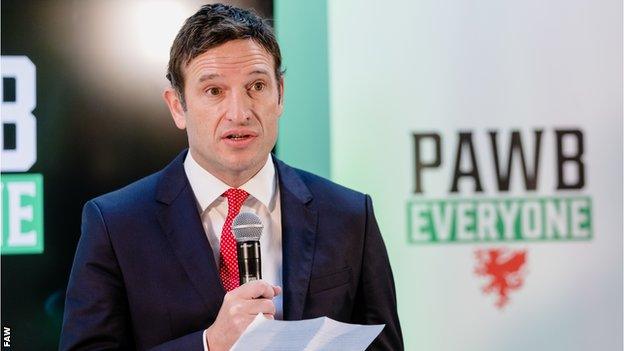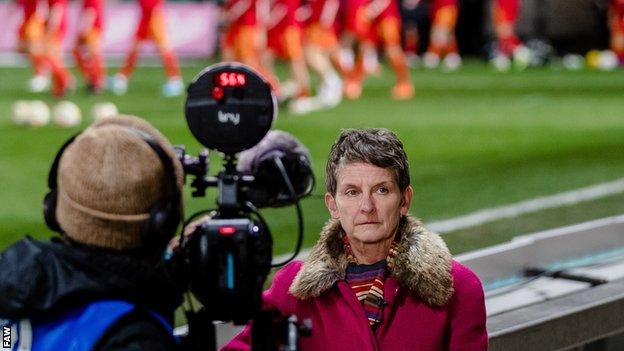World Cup 2022: How qualification could transform Welsh football on and off the field
- Published

Wales beat Austria in their World Cup play-off semi-final in March to set up Sunday's final against Ukraine
Men's World Cup qualifier play-off final: Wales v Ukraine |
|---|
Venue: Cardiff City Stadium Date: Sunday, 5 June Kick-off: 17:00 BST |
Coverage: Live on BBC Radio 5 Live, Radio Wales, Radio Cymru, BBC Sport website and app, plus live text online. Highlights on BBC One Wales from 22:30 BST and later on demand |
The brink of history. It has felt like familiar territory for Wales lately.
First there was Euro 2016, ending their 58-year wait for a major tournament and riding the wave of new highs on a seismic journey to a first semi-final. Then they backed it up with qualification for the next European Championship.
On Sunday, Wales' play-off final against Ukraine gives them a chance to free themselves from another drought: an absence from World Cups which stretches back to 1958.
The near misses of the intervening years are etched into the Welsh football psyche. To break that cycle would be the sweetest catharsis.
That much is clear. A little more difficult is quantifying what qualifying for a World Cup would mean in practical terms - on and off the field, financially, politically, culturally.
Even in the midst of their most successful era, for Wales, it could be transformative.
"For everybody in Wales it's massive," says manager Robert Page.
"This is the biggest game in Welsh history since 1958. There's no hiding behind that and we're all excited by that."
'The numbers are astronomical'
For larger countries for whom World Cup qualification is routine, the financial rewards may seem relatively unremarkable. For the Football Association of Wales, they would be game-changing.
Qualifying for the World Cup would earn the FAW at least £8m, around half its annual turnover in a normal year. If Wales were to reach another semi-final, that could rise to £38m.
The accounts for the financial year up to July 2020 - which covered the first three months of the coronavirus pandemic - saw the FAW make a post-tax loss of £1.03m having made a profit of £264,520 the previous year, with turnover for the period dropping to £14.57m from £15.32m.
The following year would show an improvement, with fans returning for home matches and prize money for qualifying for the delayed Euro 2020. But even factoring in those additional revenue streams, receiving more than £8m for World Cup qualification would represent a significant boost.
"I think the legacy, whether we qualify on the fifth of June or not - which of course we are desperate to qualify, make no mistake about that - regardless of that our national men's team have written their place in history," says FAW chief executive Noel Mooney.
"They've taken us to two major tournaments in the space of four years. We're on the cusp of getting to the mother or father of all of tournaments, the World Cup finals. Now that is different gravy.
"There are 211 countries who can play in this - it's just enormous, and the numbers are astronomical.
"First of all, you've got the practical side of making some money. There's $10.5m [£8m] on offer for teams that qualify for the World Cup - that's great.
"On top of that, we do have some sponsorships that kick in, some that could be around £1m.
"There is a rule of thumb in Europe that a third goes on operations, a third would go to the players and a third will go back into the development of football in Wales.
"So I think you are talking about north of £3m would go into grassroots facilities and improving the FAW as an organisation.
"There is a briefcase sitting on the halfway line [on Sunday] worth somewhere like £10m to the winners."
'Let the dragon roar again' - Wales set for World Cup play-off final
'Millions of miles off where we need to be with grassroots'
It is one thing securing more money, knowing how to spend it is another matter.
Much of the income received for qualifying for Euro 2016 was invested back into the elite game and, specifically, the men's senior team.
That has borne fruit with qualification for Euro 2020 and the purchase of world-class training facilities at the FAW's headquarters in the Vale of Glamorgan.
The governing body has eventually increased its spending on women's and youth football too, and now the priority is the community game.
"If we qualify for the World Cup, we will see another spurt of growth in football and Wales, and we need to be ready for that. We need grassroots facilities to do that," Mooney says.
"That is our Achilles heel. We just don't have the grassroots facilities. We need to get girls and boys playing football across Wales, which is a real shame because it holds back the country.
"Now as a country, we need to be confident going in to the future. We need to spend tens, if not hundreds, of millions of pounds across Wales on facilities. If we do that, we'll be a much happier, healthier nation.
"So the FAW and our national teams will do our part. I promise you that we'll get to major tournaments, we will get people wanting to play sports and to play football, no problem.
"We just need partners to come with us on that journey, and to help us to build the pitches that we need.
"We're millions and millions of miles off where we need to be.
"In August or September we'll announce a new fund for grassroots football that will allow all of our clubs - the 953 clubs across Wales - and other community groups to apply to improve their facilities. And it's just so important that the Welsh government and our local authorities are with us on that journey, and that we change Wales for the better."

Noel Mooney joined the FAW in 2021 from Uefa, where he was head of strategic development
'An opportunity to sell Wales to the world'
When Cardiff missed out on staging Euro 2020 matches in 2014, then FAW chief executive Jonathan Ford bemoaned the "politics" behind Uefa's decision.
It sounded almost naïve. Speaking to the Welsh delegation as they left the conference centre in Geneva, there seemed to be a feeling they had been outmanoeuvred by their counterparts from Scotland and the Republic of Ireland.
Now, the FAW hopes to have more clout in football's corridors of power.
It helps that current chief executive Mooney spent a decade with Uefa, working as head of national associations business development having previously held roles in marketing after joining from the Football Association of Ireland.
There is work to do, however, if Wales is to become a more influential player with Fifa and Uefa.
Laura McAllister is furthering that cause more than most, and last year she lost narrowly in the election to become Uefa's female representative on the Fifa Council.
The former Wales captain turned professor of politics has held numerous high-ranking administrative roles in sport and has served as deputy chair of Uefa's women's football committee since 2017.
"I'd like to see us become an exemplar of good governance, where we have independent voices who speak up for the strategy of developing the game, who speak up for the women's game and the grassroots game," McAllister says.
"I'm not trying to belittle the Euros - that's an enormous tournament and to do so well there did catapult Wales on to the global stage - but the World Cup is a level beyond again.
"It's really building on the momentum we've already got. We've qualified for consecutive Euros, we've been close so many times [to the World Cup] and a lot of us have been at those games where we've come close, but I honestly believe this is our biggest chance for such a long time.
"It's not little old Wales. If we can't beat Ukraine in a home tie, we probably don't deserve to qualify for a World Cup. Let's be realistic, we're a better side and if we play as we can, we should do it. That gives us the foundation for everything else we want to do in the game.
"More politically, it also gives the government in Wales an opportunity to use the incredible power and reach of football and sport to sell Wales as a modern, technologically-advanced, inclusive nation. It's going to provide so many opportunities to sell Wales to the world."

Laura McAllister played in every Wales game from 1994 to 2001
The economic, political and cultural benefits of World Cup qualification could be enormous for Wales.
But as McAllister warns, if Wales is to express itself as a confident nation on the global stage, those running the country and its sporting governing bodies must have clear plans in place.
"It's an opportunity but it's about making the most of that opportunity. We can't just stumble into it and expect the rewards and largesse to come," McAllister says.
"You've got to have an effective strategy for sports diplomacy, which means being consistent about how we talk about Wales.
"We're not a poor nation that's always punching above its weight on the sporting stage, we're a nation that's always been successful in sporting terms but maybe hasn't quite capitalised on that in economic and political terms.
"It will require a lot of work in a short period of time - and I'm not suggesting this is something that's not already under way - but if we qualify for Qatar on Sunday we've only got a period of months to get organised and set an ambitious target for what we want to get out of that for our nation, beyond football and beyond sport."